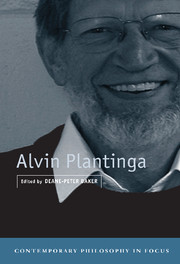Book contents
- Frontmatter
- Contents
- Contributors
- Acknowledgements
- Introduction: Alvin Plantinga, God's Philosopher
- 1 Natural Theology
- 2 Evil and Alvin Plantinga
- 3 The Modal Metaphysics of Alvin Plantinga
- 4 Natural Theology and Naturalist Atheology: Plantinga's Evolutionary Argument Against Naturalism
- 5 Two Approaches to Epistemic Defeat
- 6 Plantinga's Model of Warranted Christian Belief
- 7 Pluralism and Proper Function
- 8 Plantinga's Replacement Argument
- Appendix: Two Dozen (or so) Theistic Arguments
- Select Bibliography
- Index
7 - Pluralism and Proper Function
Published online by Cambridge University Press: 27 October 2009
- Frontmatter
- Contents
- Contributors
- Acknowledgements
- Introduction: Alvin Plantinga, God's Philosopher
- 1 Natural Theology
- 2 Evil and Alvin Plantinga
- 3 The Modal Metaphysics of Alvin Plantinga
- 4 Natural Theology and Naturalist Atheology: Plantinga's Evolutionary Argument Against Naturalism
- 5 Two Approaches to Epistemic Defeat
- 6 Plantinga's Model of Warranted Christian Belief
- 7 Pluralism and Proper Function
- 8 Plantinga's Replacement Argument
- Appendix: Two Dozen (or so) Theistic Arguments
- Select Bibliography
- Index
Summary
INTRODUCTION
Religious diversity, the fact of a wide variety of religious beliefs and traditions, raises the problem that apparently sincere and equally cognitively capable truth seekers reach widely divergent conclusions about the nature of ultimate, perhaps divine, reality. Religious exclusivists hold that their own religious beliefs are true and, therefore, that all competitor beliefs are false. Critics of exclusivism allege that it smacks of arrogance and intolerance and also seems to make moral and spiritual transformation a matter of luck. If you happen to have been born to a conservative, Christian family in the heart of America, you would have likely been a Christian; but, if you had been born in India, say, more than likely you would have been a Hindu (or in China, an atheist; or in Jordan, a Muslim; or in California, Mickey Mouse).
Just how religious diversity is offered as a defeater for one's warrant for exclusive religious beliefs can be seen in John Hick's defense of religious pluralism, which holds that the multifarious religious beliefs are equally efficacious at moral and spiritual transformation. Hick claims that there is a variety of religious traditions each of which, so far as we can tell, is equally successful in the transformation of human lives. Although they differ in their characterizations both of the goal of human life and of the processes necessary for the attainment of such goals, each of the disparate processes seems nonetheless equally well suited for the goal of the transformation of human lives from self-centeredness to what he terms ‘Reality-centeredness’.
Information
- Type
- Chapter
- Information
- Alvin Plantinga , pp. 166 - 187Publisher: Cambridge University PressPrint publication year: 2007
Accessibility standard: Unknown
Why this information is here
This section outlines the accessibility features of this content - including support for screen readers, full keyboard navigation and high-contrast display options. This may not be relevant for you.Accessibility Information
- 1
- Cited by
